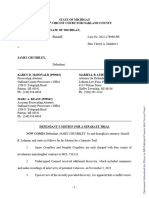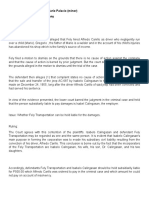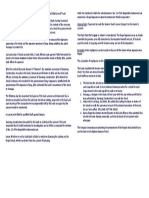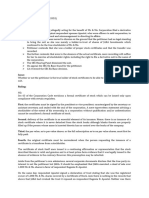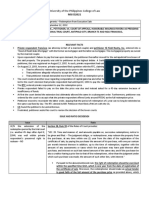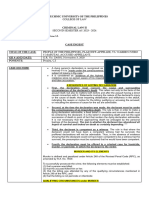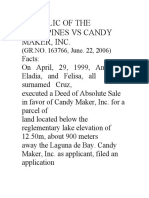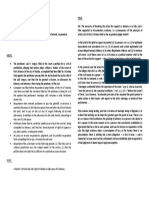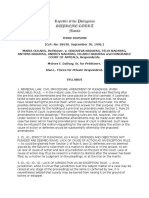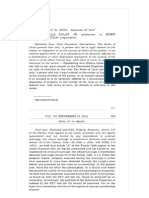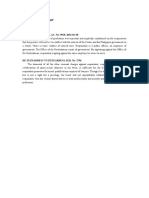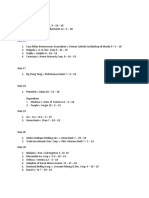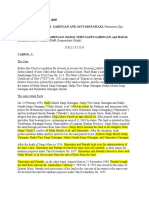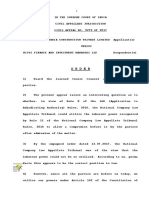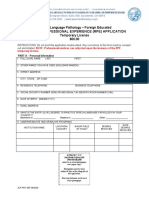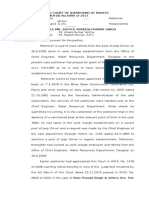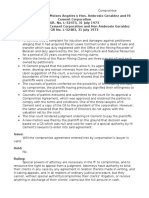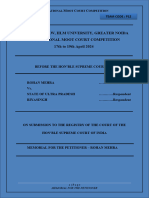0 ratings0% found this document useful (0 votes)
97 viewsRepublic of The Philippines vs. Kenrick Development Corporation
This document discusses a case between the Republic of the Philippines and Kenrick Development Corporation regarding ownership of land. The key events were:
1) Kenrick Development filed an answer purportedly signed by their lawyer, Atty. Garlitos, but he later testified he did not authorize anyone to sign for him.
2) Based on this, the Republic filed to have Kenrick Development declared in default for failing to file a valid answer. The trial court agreed.
3) The Court of Appeals reversed, finding Kenrick Development had adopted the statements of their lawyer as their own through their actions, making his statements an "adoptive admission" that was binding on Kenrick Development.
Uploaded by
AlexPamintuanAbitanCopyright
© © All Rights Reserved
Available Formats
Download as DOCX, PDF, TXT or read online on Scribd
0 ratings0% found this document useful (0 votes)
97 viewsRepublic of The Philippines vs. Kenrick Development Corporation
This document discusses a case between the Republic of the Philippines and Kenrick Development Corporation regarding ownership of land. The key events were:
1) Kenrick Development filed an answer purportedly signed by their lawyer, Atty. Garlitos, but he later testified he did not authorize anyone to sign for him.
2) Based on this, the Republic filed to have Kenrick Development declared in default for failing to file a valid answer. The trial court agreed.
3) The Court of Appeals reversed, finding Kenrick Development had adopted the statements of their lawyer as their own through their actions, making his statements an "adoptive admission" that was binding on Kenrick Development.
Uploaded by
AlexPamintuanAbitanCopyright
© © All Rights Reserved
Available Formats
Download as DOCX, PDF, TXT or read online on Scribd
You are on page 1/ 2
ADMISSIONS AND CONFESSIONS
REPUBLIC OF THE PHILIPPINES DEVELOPMENT’s former counsel. He testified that he prepared
vs. KENRICK DEVELOPMENT’s answer and transmitted an unsigned
KENRICK DEVELOPMENT CORPORATION draft to KENRICK DEVELOPMENT’s president, Mr. Victor Ong.
August 8, 2006 G.R. No. 149576 The signature appearing above his name was not his. He authorized no
one to sign in his behalf either. And he did not know who finally
signed it.
FACTS: With Atty. Garlitos’ revelation, the Republic promptly filed an
urgent motion on December 3, 1998 to declare KENRICK
DEVELOPMENT in default, predicated on its failure to file a valid
answer. The Republic argued that, since the person who signed the
This case stemmed from the construction by KENRICK answer was neither authorized by Atty. Garlitos nor even known to
DEVELOPMENT. Kenrick Development Corporation of a concrete him, the answer was effectively an unsigned pleading. Pursuant to
perimeter fence around some parcels of land located behind the Civil Section 3, Rule 7 of the Rules of Court, it was a mere scrap of paper
Aviation Training Center of the Air Transportation Office (ATO). and produced no legal effect.
Parcels of land were allegedly registered in the name of Alfonso
Concepcion. As a result, the ATO was dispossessed of some 30,228 RTC: Granted Republic’s motion, declared defendant in default,
square meters of prime land. KENRICK DEVELOPMENT justified allowed Republic to present evidence ex parte. It found KENRICK
its action with a claim of ownership over the property. DEVELOPMENT’s answer to be sham and false and intended to
defeat the purpose of the rules.
The Solicitor General filed a complaint for revocation,
annulment and cancellation of certificates of title in behalf of the Motion for Reconsideration by KENRICK DEVELOPMENT :
Republic of the Philippines (as represented by the LRA) against Denied. Petition for certiorari.
KENRICK DEVELOPMENT and Alfonso Concepcion.
CA: Reversed RTC
On December 5, 1996, KENRICK DEVELOPMENT filed its
answer which was purportedly signed by Atty. Onofre Garlitos, Jr. as ISSUE:
counsel for KENRICK DEVELOPMENT. Since Alfonso Concepcion
could not be located and served with summons, the trial court ordered Whether or not the Court of Appeals err in reversing the
the issuance of an alias summons by publication against him on trial courts order which declared respondent in default for its failure to
February 19, 1997. file a valid answer?
The case was thereafter punctuated by various incidents relative to RULING:
modes of discovery, pre-trial, postponements or continuances, motions
to dismiss, motions to declare defendants in default and other Yes, it did.
procedural matters.
A party may, by his words or conduct, voluntarily adopt or
During the congressional hearing held on November 26, 1998, one ratify anothers statement. Where it appears that a party clearly and
of those summoned was Atty. Garlitos, KENRICK unambiguously assented to or adopted the statements of another,
ADMISSIONS AND CONFESSIONS
evidence of those statements is admissible against him. This is the
essence of the principle of adoptive admission.
An adoptive admission is a party’s reaction to a statement or
action by another person when it is reasonable to treat the party’s
reaction as an admission of something stated or implied by the other
person. By adoptive admission, a third person’s statement becomes the
admission of the party embracing or espousing it. Adoptive admission
may occur when a party:
(a) expressly agrees to or concurs in an oral statement made by
another;
(b) hears a statement and later on essentially repeats it;
(c) utters an acceptance or builds upon the assertion of another;
(d) replies by way of rebuttal to some specific points raised by
another but ignores further points which he or she has
heard the other make or
(e) reads and signs a written statement made by another.
Here, respondent accepted the pronouncements of Atty.
Garlitos and built its case on them. At no instance did it ever deny or
contradict its former counsels statements. Evidently, respondent
completely adopted Atty. Garlitos statements as its own. Respondents
adoptive admission constituted a judicial admission which was
conclusive on it.
You might also like
- James Crumbley - Motion For Separate TrialNo ratings yetJames Crumbley - Motion For Separate Trial3 pages
- Barco v. CA, G.R. 120587, 20 January 2004No ratings yetBarco v. CA, G.R. 120587, 20 January 20043 pages
- Heirs of Paula C. Fabillar, As Represented by Aureo Fabillar vs. Miguel M. Paller, Florentina P. Abayan, and Demetria P. SagalesNo ratings yetHeirs of Paula C. Fabillar, As Represented by Aureo Fabillar vs. Miguel M. Paller, Florentina P. Abayan, and Demetria P. Sagales7 pages
- 1.digested Umale vs. ASB Realty Corp. GR. No. 181126 June 15 2011No ratings yet1.digested Umale vs. ASB Realty Corp. GR. No. 181126 June 15 20114 pages
- G.R NO. 162930 DECEMBER 5, 2012 Zamora vs. Spouses MirandaNo ratings yetG.R NO. 162930 DECEMBER 5, 2012 Zamora vs. Spouses Miranda2 pages
- ESTRELLITA TADEO-MATIAS, Petitioner, vs. REPUBLIC OF THE PHILIPPINES, Respondent G.R. No. 230751. April 25, 2018No ratings yetESTRELLITA TADEO-MATIAS, Petitioner, vs. REPUBLIC OF THE PHILIPPINES, Respondent G.R. No. 230751. April 25, 20183 pages
- Strocheker vs. Ramirez - G.R. No. 18700 - September 26, 1922No ratings yetStrocheker vs. Ramirez - G.R. No. 18700 - September 26, 19221 page
- JUDICIAL NOTICE Habagat Grill v. DMC Urban DeveloperNo ratings yetJUDICIAL NOTICE Habagat Grill v. DMC Urban Developer2 pages
- Obligations and Contracts - Trusts - Case 127 - Orendain, Jr. Vs Trusteeship of The Estate of Dona Margarita RodriguezNo ratings yetObligations and Contracts - Trusts - Case 127 - Orendain, Jr. Vs Trusteeship of The Estate of Dona Margarita Rodriguez2 pages
- Special Civil Actions and Special Proceedings Second Half Reviewer UPDATED 01 - 03 - 2024No ratings yetSpecial Civil Actions and Special Proceedings Second Half Reviewer UPDATED 01 - 03 - 202473 pages
- People vs. Ivero y Mabutas, G.R. No. 236301No ratings yetPeople vs. Ivero y Mabutas, G.R. No. 2363014 pages
- Case List 2 MBTC Vs Pascual, GR #163744, 29 Feb 2008No ratings yetCase List 2 MBTC Vs Pascual, GR #163744, 29 Feb 20082 pages
- 3smith, Bell & Co. (LTD.) V Natividad - ConceptsNo ratings yet3smith, Bell & Co. (LTD.) V Natividad - Concepts1 page
- (V) DST Movers Corp. vs. People's General Insurance Corp., G.R. No. 198627, 13 January 2016No ratings yet(V) DST Movers Corp. vs. People's General Insurance Corp., G.R. No. 198627, 13 January 20164 pages
- Rosario v. Government Service Insurance System, GR 200991, 18 March 2021No ratings yetRosario v. Government Service Insurance System, GR 200991, 18 March 202113 pages
- Real Property Covering Seven Parcels of Land in Favor of Her Niece Ursulina Ganuelas (Ursulina)No ratings yetReal Property Covering Seven Parcels of Land in Favor of Her Niece Ursulina Ganuelas (Ursulina)4 pages
- Legal Ethics Review: (Cayetano v. Monsod, G.R. No. 100113)No ratings yetLegal Ethics Review: (Cayetano v. Monsod, G.R. No. 100113)8 pages
- Practice of Law: FAJARDO v. ALVAREZ, AC. No. 9018, 2016-04-20No ratings yetPractice of Law: FAJARDO v. ALVAREZ, AC. No. 9018, 2016-04-201 page
- Moral Turpitude Includes Everything Which Is Done Contrary To Justice, Honesty, Modesty, or Good MoralsNo ratings yetMoral Turpitude Includes Everything Which Is Done Contrary To Justice, Honesty, Modesty, or Good Morals7 pages
- US v. Long 1983 Winning Trial Transcript IRS CaseNo ratings yetUS v. Long 1983 Winning Trial Transcript IRS Case428 pages
- THE PUNJAB PROHIBITION OF PRIVATE MONEY LENDING ACT 2007 - Punjab-Prohibition-Of-Private-Money-Lending-Act-2007 PDFNo ratings yetTHE PUNJAB PROHIBITION OF PRIVATE MONEY LENDING ACT 2007 - Punjab-Prohibition-Of-Private-Money-Lending-Act-2007 PDF3 pages
- Luzon Iron Development Group Corporation v. Bridestone Mining, 813 SCRA 584No ratings yetLuzon Iron Development Group Corporation v. Bridestone Mining, 813 SCRA 5842 pages
- Transimex V Mafre Insurance - Case DigestNo ratings yetTransimex V Mafre Insurance - Case Digest3 pages
- University of The Philippines College of Law: CPE, 1-DNo ratings yetUniversity of The Philippines College of Law: CPE, 1-D1 page
- Lokhandwala Kataria Construction Pvt. Ltd. Vs Nisus Finance and Investment Manager, LLPNo ratings yetLokhandwala Kataria Construction Pvt. Ltd. Vs Nisus Finance and Investment Manager, LLP3 pages
- Criminal Justice Study Group Letter of RecommendationsNo ratings yetCriminal Justice Study Group Letter of Recommendations10 pages
- 04.a. Uy Tioco vs. Imperial (G.R. No. L-29414)No ratings yet04.a. Uy Tioco vs. Imperial (G.R. No. L-29414)2 pages
- Frederick Henry Vahlsing, Jr. v. Commercial Union Insurance Co., Inc., 928 F.2d 486, 1st Cir. (1991)No ratings yetFrederick Henry Vahlsing, Jr. v. Commercial Union Insurance Co., Inc., 928 F.2d 486, 1st Cir. (1991)8 pages
- 2021 RPE - Initial Application For Speech LicenseNo ratings yet2021 RPE - Initial Application For Speech License2 pages
- Petitioner-Appellant Vs Vs Oppositors-Appellees Sotto & Sotto, Alafriz & AlafrizNo ratings yetPetitioner-Appellant Vs Vs Oppositors-Appellees Sotto & Sotto, Alafriz & Alafriz3 pages
- In The High Court of Jharkhand at Ranchi W.P. (S) No.6080 of 2011No ratings yetIn The High Court of Jharkhand at Ranchi W.P. (S) No.6080 of 20113 pages
- RECORD OF COMPLIANCE-Permit Application SupplementNo ratings yetRECORD OF COMPLIANCE-Permit Application Supplement3 pages
- 18 U.S. Code 1519 - Destruction, Alteration, or Falsification of Records in Federal Investigations100% (1)18 U.S. Code 1519 - Destruction, Alteration, or Falsification of Records in Federal Investigations4 pages
- NCST Culture 2 PPTX Module 3 Bill of RightsNo ratings yetNCST Culture 2 PPTX Module 3 Bill of Rights28 pages
- Challenges To The Indigenous Peoples Right Act of 1997"No ratings yetChallenges To The Indigenous Peoples Right Act of 1997"3 pages
